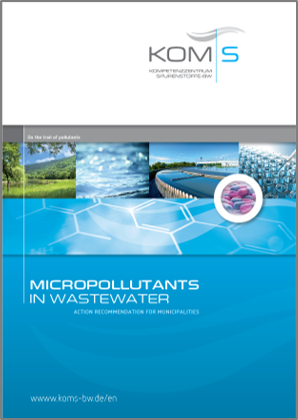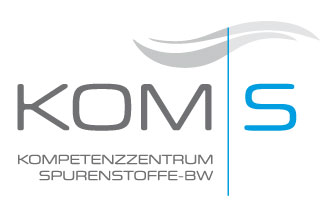Micropollutants Competence Centre BW
The Micropollutants Competence Centre Baden-Württemberg is dedicated to the build-up and transfer of knowledge regarding the subject of micropollutants and their removal from wastewater. In addition, it considers itself a platform for the exchange of information and experiences regarding the process-technical implementation. KomS is a cooperation between the University of Stuttgart, Biberach University of Applied Sciences and the Baden-Württemberg chapter of the DWA and is funded by the Ministry of the Environment, Climate Protection and the Energy Sector of the federal state of Baden-Württemberg.
Welcome to Kompetenzzentrum Spurenstoffe Baden-Württemberg
For around a decade, the topic of micropollutants has been intensively discussed in the wastewater sector both on a national and international level. There is no mistaking that wastewater treatment plants are regarded as primarily responsible for emitting these substances into water bodies.
Our wastewater is loaded by a multitude of synthetic residues – from pharmaceutical products, household chemicals and cosmetic care products, dietary supplements and others. Thanks to further developed analytical methods these micro-pollutants can always capable of being distinguished. Using the normal technical wastewater treatment processes many substances cannot be deliberately removed, and often only to a small extent, and thus they get into the environment. There, they are degraded only very slowly or not all. The effects of such trace elements and the therefrom resultant interactions on ecosystems and organisms are currently not foreseeable. Therefore, along with awareness training in the community for this topic, the removal of trace elements from wastewater, building on the precautionary ideas, is accorded a decisive significance.
In Baden-Württemberg, on the basis of findings from investigations on a semi-industrial scale, so far several wastewater treatment plants have been retrofitted with an additional treatment stage for the removal of trace elements. Here, to date, for the removal of the micro-pollutants, activated carbon processes have been employed which, currently, along with ozoning, are seen as suitable processes for the removal of trace elements from wastewater. Concomitant to the first expansions of the wastewater treatment plants and for the support of the operators, the Competence Centre Trace Elements – KomS- Baden-Württemberg was set up in April 2012.
The KomS is a cooperation between three independent partners: The University of Stuttgart and the Biberach University bring their scientific competence and technical knowledge into the further development of the process technology as well as into the documentation and assessment of measured results. The DWA Regional Association Baden-Württemberg (DWA-BW) takes on the wide spectrum of communication, specialist events and excursions as well as advanced training within the neighbourhood.16.07.2021
New publication - Micropollutants in wastewater
Active substances in pharmaceuticals, pesticides, cosmetic products, cleaning products, industrial chemicals and other products: a multitude of substances contained in our wastewater continue to enter bodies of water, causing severe harm to the ecosystem, even though the extension of wastewater treatment plants has progressed to an exhaustive degree. However, an advanced treatment stage is able to eliminate the majority of these micropollutants in wastewater treatment plants. This way, bodies of water can be protected much better and at more reasonable costs than by using conventional technology, which reaches its limits with regard to micropollutants.
1st edition, June 2021
25 pages, A4
You can download our brochure here (PDF file).

26.03.2021
KomS-Webinar on March 26th, 2021 // Measures for reducing emissions of micropollutants into urban waters – current state in Europe

Inspired by the world water day, the 7th KomS-Webinar took place with almost 60 participants addressing the following topic „Measures for reducing emissions of micropollutants into urban waters – current state in Europe" on March 26th, 2021.
It focused on the strategic approach of different European states (Germany, Switzerland, Sweden) regarding the reduction of the emissions of micropollutants.
Program:
Current state at the EU level // Dr. Alberto Pistocchi, European Commission, DG Joint Research Centre, Ispra (Italy)
Current state in Sweden // Dr. Michael Cimbritz, Department of Chemical Engineering - Lund University (Sweden)
Current state in Germany // Dr. Felix Tettenborn, Fraunhofer ISI, Karlsruhe (Germany)
Micropollutant Strategy of Baden-Württemberg // Dr. Ursula Maier, Ministry of Environment Baden-Württemberg (Germany)
Current state in the Netherlands // Cora Uijterlinde, STOWA Foundation for applied water research, Amersfoort (NL)
Current state in Switzerland // Aline Brander, VSA-Plattform, Dübendorf (Switzerland)
Buy video recording (click here)
DWA Landesverband Baden-Württemberg
Rennstraße 8 | 70499 Stuttgart | Phone: 0711 89 66 31-0 | E-Mail: info(at)dwa-bw.de
© Deutsche Vereinigung für Wasserwirtschaft, Abwasser und Abfall e. V. // (DWA)
DWA Landesverband
Baden-Württemberg
Rennstraße 8 | 70499 Stuttgart
Phone: 0711 89 66 31-0
E-Mail: info(at)dwa-bw.de
© Deutsche Vereinigung für Wasserwirtschaft, Abwasser und Abfall e. V. // (DWA)






